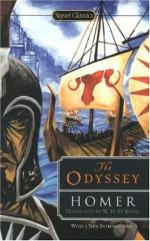|
This section contains 787 words (approx. 3 pages at 300 words per page) |

|
All in the Family: the Royal Hero in Homer's Odyssey
Summary: In Homer's classic work Odyssey, the way in which he describes his characters reveals a particularly fascinating aspect of the Greek tradition. To Homer greatness, heroism, and honor are associated only with individuals born originally into royalty or nobility. To this end, he speaks well in the Odyssey of those individuals of noble birth, even if they are mere beggars or swineherds; whereas he looks down upon those who were not born into this class.
Widely regarded as one of the finest works of literature ever produced, Homer's Odyssey has earned its place among the classics. In the Odyssey, Homer reveals ancient Greece, with its distinct conceptions of hospitality, battlefield glory, and the importance of family and home. A fascinating aspect of the Greek tradition is seen in the contrasting treatment of characters found in the Odyssey. Every character Homer speaks well of is also a character of royal descent. They may be introduced as exalted, disguised, or downfallen, but Homer only portrays those of noble birth as heroic, and they alone are worthy of honor.
Odysseus, the son of royal Laertes, is the first and more obvious example of heroism. Of him Menelaos declares, "How I loved the man / And how he fought through hardship for my sake!"[1] Time and again, Odysseus is praised for his cunning, clear thinking, and wisdom. His...
|
This section contains 787 words (approx. 3 pages at 300 words per page) |

|


